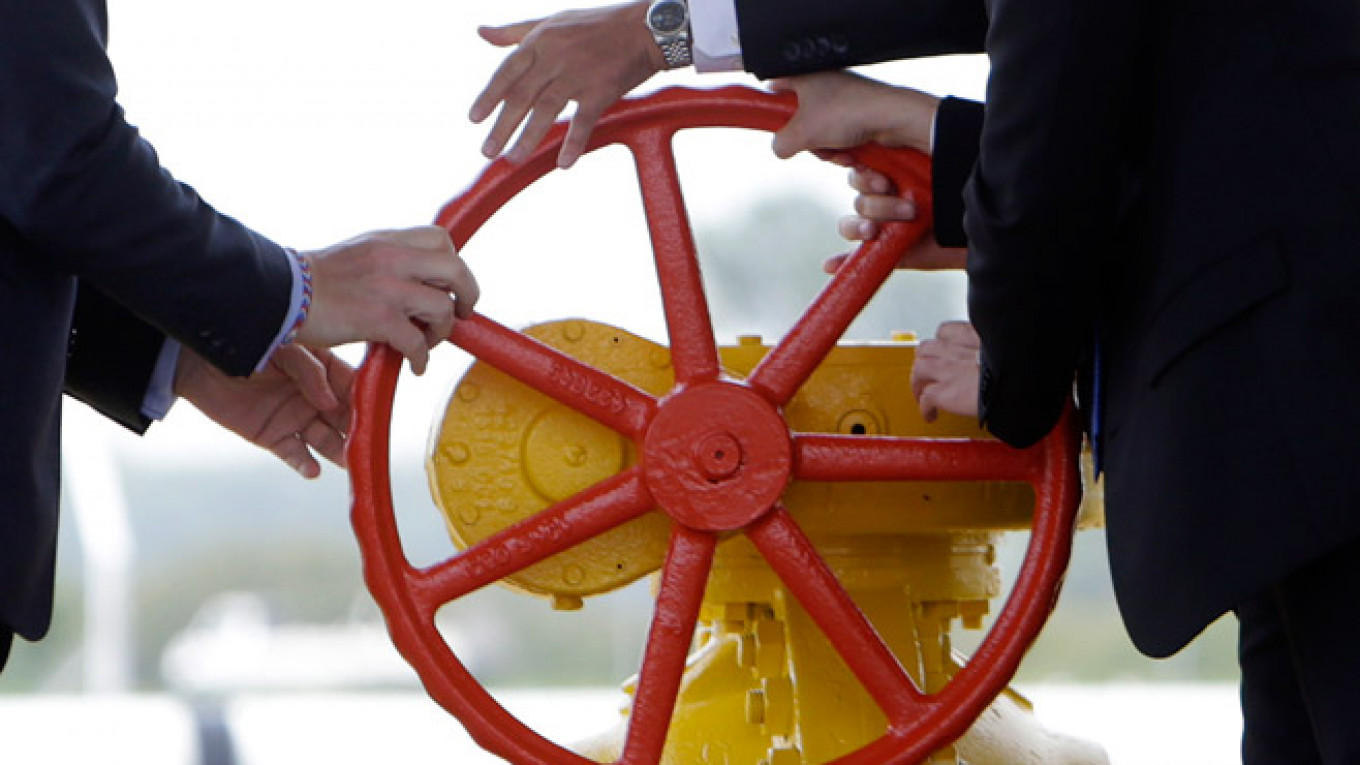Ukraine on Monday opened its gas transit infrastructure to potential Western investors, but kept the door firmly shut on its key supplier-turned-antagonist, Russia's Gazprom.
By signing into law a bill allowing foreign companies to buy equity stakes in the country's outdated gas network — a vital corridor through which Europe receives one fifth of its gas — Ukrainian President Petro Poroshenko hopes to guarantee Ukraine's lucrative position on Russia's gas export route and see off the challenge of South Stream pipeline, which would bypass Ukraine.
But analysts doubt that foreign energy majors will rush to get involved.
European and U.S. companies will be permitted to buy up to 49 percent of shares in a newly created company that will operate the system, according to a document published on the official website of Ukraine's parliament. The Ukrainian government will keep a majority stake.
The law envisages that foreign investors in the gas network will be chosen by open tender, but the Verkhovna Rada, the country's parliament, will still have the last word in the choice of participants.
Russia's Gazprom will not be one of them.
State-owned Gazprom has long been interested in Ukraine's pipeline operator, through which it sends half of its exports to Europe, its most important market. But the company, which has shut off gas supplies to Ukraine three times in the last decade, most recently in June, will not be considered, the document said.
Moscow's annexation of Crimea in March and its support of separatists in eastern Ukraine have prompted intense hostility toward Russia in Kiev, where the government is desperate to bring in Western allies against the perceived threat from Russia.
Kill South Stream
The document said Gazprom had been excluded from bidding because of its insistence on the construction of South Stream, a $46 billion pipeline project that will traverse the Black Sea and southern Europe, bypassing Ukraine and diminishing its importance as a transit country.
Slated for completion in 2018, the South Stream project has repeatedly slammed into the buffers of European competition legislation and is viewed negatively by many European countries worried by the Kremlin's control over Russian gas flows, but is seen as an economic boon by the countries it will pass through.
Justifying the need to allow foreign companies access to Ukraine's gas network earlier this year, Ukraine's Prime Minister, Arseniy Yatseniyuk, said foreign investors would not only enable badly needed modernization of the Soviet-era pipes, but would help convince Europe to ban South Stream and increase transit volumes through Ukraine.
"If European companies participate in the operator [of Ukraine's gas network], Russia will not build South Stream," Yatseniyuk told lawmakers in June, when the bill was discussed in the Rada.
If Gazprom and its European contractors did build South Stream, transit volumes going through the country would be cut by almost half, he warned.
Ukraine earns about $3 billion a year from transiting Russian gas to Europe — a valuable source of income for a badly-managed economy in deep recession, said Alexey Grivach, deputy head of Moscow-based National Energy Security Fund.
Who Is Interested?
Stretching over 38,000 kilometers in total, Ukraine's gas network is one of the biggest in Europe. According to Naftogaz, Ukraine's state-owned gas importer and producer, it has the capacity to supply Europe with more than 140 billion cubic meters of gas per year and is valued at $25 billion to $35 billion. Last year, Gazprom, the pipeline's only direct supplier, transported 86 billion cubic meters of gas to its European customers.
Three Western companies are interested in modernizing this infrastructure and scooping up their portion of transit revenues, TASS news agency reported in August, citing unidentified sources.
Among them, the agency said, was U.S. energy giant Chevron. The company since refused to comment to other publications, and could not provide immediate comment on Monday.
According to Grivach, investing would be a gamble for Chevron: "Ukraine is a big risk both for Gazprom and for foreign companies," he said.
Spending a couple of millions of dollars on an office in Kiev in return for a share of transit revenues sounds like an attractive proposition, he said, but there is no guarantee that large required investments in modernizing the system would reap rewards.
This would be worth it only if there was a guarantee the pipeline would be fully loaded with gas — something only Gazprom can give — backed by obligations on Ukraine's part that it would ensure its safe transit, Grivach said.
Contact the author at [email protected]
A Message from The Moscow Times:
Dear readers,
We are facing unprecedented challenges. Russia's Prosecutor General's Office has designated The Moscow Times as an "undesirable" organization, criminalizing our work and putting our staff at risk of prosecution. This follows our earlier unjust labeling as a "foreign agent."
These actions are direct attempts to silence independent journalism in Russia. The authorities claim our work "discredits the decisions of the Russian leadership." We see things differently: we strive to provide accurate, unbiased reporting on Russia.
We, the journalists of The Moscow Times, refuse to be silenced. But to continue our work, we need your help.
Your support, no matter how small, makes a world of difference. If you can, please support us monthly starting from just $2. It's quick to set up, and every contribution makes a significant impact.
By supporting The Moscow Times, you're defending open, independent journalism in the face of repression. Thank you for standing with us.
Remind me later.






